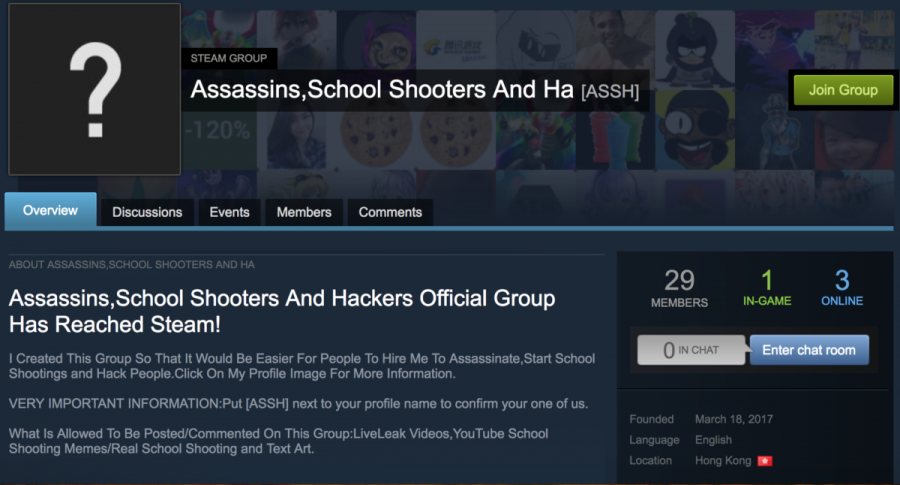Gaming app has 173 groups that glorify school shooters
March 5, 2018
This story was originally published by Reveal from The Center for Investigative Reporting, a nonprofit news organization based in the San Francisco Bay Area. Learn more at revealnews.org and subscribe to the Reveal podcast, produced with PRX, at revealnews.org/podcast.
One of the world’s largest online gaming platforms has a thriving community dedicated to glorifying and discussing school shootings. That’s despite clear rules barring “inappropriate or offensive content” on the platform, Steam.
As of Wednesday morning, we counted 173 Steam groups that blatantly venerate past school shooters.
For example, this group paints a sympathetic picture of school shooters as victims of bullying:
Groups like this one contain frequent references to racism and homophobia:
This group, perhaps ironically, advertises its creator’s intention to carry out school shootings on behalf of others.
Many use photos of notorious killers such as Elliot Rodger, who murdered six people near University of California, Santa Barbara in 2014, in retribution for being rejected by women. The misogyny that drove Rodger’s violence is frequently celebrated.
Some of the groups link to external sites, such as YouTube, or personal sites where members have posted videos and imagery of school mass shooters such as Dylan Klebold and Eric Harris, who killed 13 students and themselves in a shooting at Columbine High School in Colorado.
There are even discussions about whom school shooters should target during future rampages.
This group appropriates a widely used meme format for its profile image.
Most of the groups in question are relatively small and don’t have a large volume of user comments.
Steam is by far the most popular venue for what’s known as PC gaming, the act of playing games online with a personal computer as opposed to a console like a PlayStation. Steam is essentially an online app that allows players to buy and download games. Players can also use the site to communicate with and play alongside other gamers. And Steam has a social networking community that allows users to form groups such as those named for school shootings.
On Thursday, the White House announced that President Donald Trump will meet with video game industry leaders next week to talk about school shootings.
Blaming video games has been a common refrain after school shootings, but experts largely contest any direct connection between playing violent video games and gamers engaging in real-life violence. On Steam, users might not be inspired by violent games, but rather taking advantage of the lightly moderated forum provided by the platform.
The company said last year that it has 67 million monthly active players and a total user base of 125 million members. Valve, the company that runs Steam, is worth billions of dollars. Gabe Newell, Valve’s CEO, has an estimated net worth of $5.5 billion, according to Forbes.
Representatives from Valve did not respond to requests for comment.
The context: The next school shooter could be posting online right now
Several recent high-profile mass shooters were active in the dark underbelly of the internet. A report last month from the Southern Poverty Law Center identified 13 mass shootings committed since 2014 by disaffected young men aligned with the alt-right movement. A common theme in those shootings was that the men spent a lot of time online, posting racist and misogynistic content.
One such shooter, William Edward Atchison, who killed two people during a shooting spree at a New Mexico high school in December, was active on Steam. He frequently posted racist and violent content to the site, the Daily Beast reported.
These school shooting groups were available on Steam for months after Atchison’s history of posting to the site came to light.
In the wake of the Parkland, Florida, shooting that killed 17 people last month, the FBI has come under scrutiny for failing to act on ominous online posts from the accused shooter, Nikolas Cruz. The Steam pages show how widespread the admiration and conversation about school shooting is online, and how little some platforms have done to stop it.
Users of other online platforms also have formed fandom communities for school shooters, a phenomenon that dates back to the immediate aftermath of the Columbine shooting. There are a number of school shooter groups on Facebook, for example.
There’s a debate over how seriously to take these groups
A recently published study by researchers at Finland’s University of Tampere looked into the online subcultures glorifying school shooters. In interviews with participants, they discovered many people involved in these communities found the perpetrators personally sympathetic, both in terms of their interests and their negative experiences with bullying.
One respondent said:
(Columbine shooters) Eric (Harris) and Dylan (Klebold) are easy to relate to. Two white kids that listened to angry music from a different country. The characters they played to the world were cool bad guys. I’m sure in real life they were nerdy, geeky and not as cool as they pass themselves off as but many people, kids especially can see themselves as either them or friends of theirs. They like the same music, play the same games. They were not bad looking and when they put on their “uniforms” they became almost like comic book antiheroes.
Another talked about emulating the dress and attitudes of school shooters:I remembered that people would dress up like Eric and Dylan, wearing trench coats or long black coats, black clothing, leather boots or dr. martens and especially their famous t-shirts (“natural selection” and “wrath”). I wore Dylan’s t-shirt too, dressed up in black and wore a long black coat during that time.
It’s important to note there’s often a strong aspect of performative irony at work with these groups. Online troll communities regularly encourage content deliberately designed to be as offensive as possible. Seemingly outlandish claims are posted with the intention of sparking either mirthful or horrified reactions from other users, regardless of the sincerity of the posters’ intentions.
While the people interviewed by the Finnish researchers insisted that they personally weren’t interested in carrying out copycat shootings, they acknowledged the inevitability that someone in their groups would likely engage in violence. As one respondent said: When you are in a community like this for a long period of time it’s only a matter of time (before) someone you know or even just talk to or read their posts kills people or tries to.
Adam Lanza, who killed 20 children in the 2012 mass shooting at Sandy Hook Middle School, also frequently posted in an online forum devoted to school shootings.
George Haslett knows Steam well. He’s a 26-year-old gamer who has logged more than 4,000 hours playing games there.
He played down the significance of the community section of Steam, which houses the school shooting groups. Unlike, say, Facebook, where friends use groups to frequently talk to each other and share ideas, groups on Steam are of limited relevance to most users, he said. They’re essentially just a way for gamers to organize into collectives or teams.
Haslett cautioned about reading too much into the names of the groups, which, while shocking to outsiders, are pretty mild by the standards of discourse in online gaming.
“If you sat down and fired up ‘Counter Strike’ or ‘League of Legends’ or any of those competitive games and started trying to play it competitively, within a few hours you’d be told to kill yourself several times, or told to get cancer or told that your parents should get cancer. That’s a normal experience playing games,” he said.
The Nazis are on Steam, too
In addition to school shooting groups, we also found a large number of white supremacist and neo-Nazi groups on Steam.
Steam’s racist far-right groups also didn’t tend to have a large number of comments, many contained links to chat rooms on the video gaming-focused chat platform Discord.
Discord was a major venue for discussion and planning for the deadly white supremacist rally in Charlottesville, Va., last year.
In recent days, Steam appears to have pulled down a number of white supremacist groups. For example, a group claiming affiliation with the violent white supremacist organization AtomWaffen Division, was removed from the site earlier this week. However, we were able to archive the page before it was suspended.
Earlier this year, after Atchison’s Steam postings came to light, we filed a Freedom of Information Act request with the FBI asking for information about its investigations into extremist organizing on Steam. However, agency officials responded by saying a search of the FBI’s Central Records System did not produce any responsive documents.
We have filed a formal appeal with the agency.
Sign up to get The Hate Report by email every Friday.
Have a hate incident to report? Tell us about it here, or contact The Hate Report team: Aaron Sankin can be reached at [email protected], and Will Carless can be reached at [email protected]. Follow them on Twitter: @asankin and @willcarless.
![]()


















